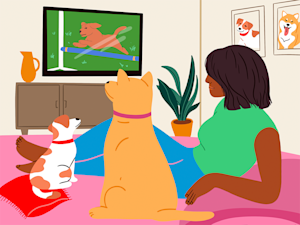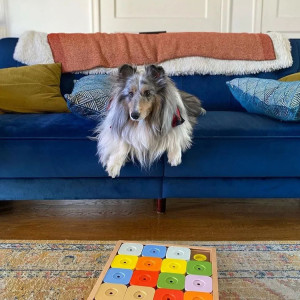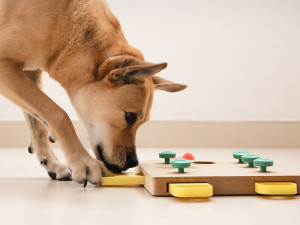Why Do Dogs Watch TV?
Yes, pups can be couch potatoes, just like their parents.

Share Article
In This Article:
Do Dogs Watch TV?opens in a new tab What Do Dogs Like to Watch on TV?opens in a new tab Do Dogs Think TV Is Real?opens in a new tab Why Do Some Dogs Watch TV and Others Don’t?opens in a new tab What Does It Say About Your Dog if They Like Watching TV?opens in a new tab
You’ve settled in for a cozy evening, ready to dive into your favorite series. Your dog hops up on the couch beside you, their head tilting curiously toward the TV screen. They seem riveted by the action, ears twitching, maybe an excited yip or bark during an intense scene. Do dogs watch TVopens in a new tab, or are they drawn to the movement?
Dogs are curious, and TV can be surprisingly engaging — whether it’s the sound of an on-screen doorbell or the sight of another animal. But not all dogs are glued to the screen. While some show interest, others could care less, preferring to snooze or chew on their favorite toy.

littleKin™ is Kinship’s home just for puppy and kitten parents. Bop over to check out expert advice, new pet tools, and special deals—all curated for your newest family member.
opens in a new tabWhat makes some dogs captivated by TV screens? Does their interest say something about their intelligence, personality, and instincts? Keep reading to find out why.
Main takeaways
Dogs process TV images differently than humans. Their dichromatic vision and faster TV refresh rates make modern HD screens more engaging than older models.
Programs featuring movement, animals, or sounds, especially in blue and yellow hues, are more likely to captivate a dog’s attention.
Some dogs react to TV as if it’s real, but their reliance on smell means they likely don’t fully perceive it as reality.
A dog’s interest in TV depends on factors like personality, breed, and experiences, with intelligent or curious breeds often showing the most interest.
Leaving the TV on for your dog can help reduce boredom and anxiety, but it’s no replacement for quality interaction, exercise, and human connection.
Do dogs watch TV?
Yes, just like some humans, some dogs watch TV. Dogs can process images faster than humans, meaning the frames on your screen appear smoother to them than to us. While our human brains register screen movements at 60 frames per second, dogs have a refresh rate of 75 frames per second. This explains why older TVs don’t grab their attention like modern HD screens.
Dogs’ viewing experiences are shaped by their vision. Dogs have dichromatic vision, meaning they see best in shades of yellow and blue. Pups would likely perk up more for a vibrant nature documentary than a made-for-TV drama or soap opera with muted tones. Audio cues also significantly affect how a dog interacts with TV. The squeak of a toy or another barking dog can draw your dog’s attention. Dogs can and do watch TV, but their experience is distinctly canine.
What do dogs like to watch on TV?
Dogs are drawn to TV programsopens in a new tab that feature other animals, especially if those animals bark, move, or make interesting noises. Shows such as nature documentaries or pet streaming channels tend to grab their attention. Some dogs love watching sports because the fast movement of the ball and people mimics their favorite game of fetch.
If your dog spends most of their time with you, they may pick up on your emotions and energy while watching certain shows. Your laughter, gasps, breathing, or even shouting at the screen could make them curious enough to tune in.
Do dogs think TV is real?
Dogs have unique senses, so while they may respond to images on TV as though they’re real, their noses know better. Dogs may bark at on-screen animals, tilt their heads at interesting sounds, and run to the screen, but dogs interpret the world through smell.
According to Dr. Alisha Kidwellopens in a new tab, a licensed veterinarian at North Carolina’s Cabarrus Animal Hospital, dogs rely heaviest on their senses of smell. Without accompanying scents, they likely don’t perceive TV as “real,” even if their actions sometimes suggest otherwise.
Dogs’ reactions are a fascinating mix of instinct and curiosity. When a dog barks at a lion on the screen or whines at the sound of a crying puppy, they are reacting to visual and auditory stimuli, rather than believing the lion or puppy is in the room with them. This behavior highlights sensitivity to sights, sounds, and emotions. For dogs, TV is an intriguing puzzle of moving shapes and sounds instead of a replica of the real world.
Why do some dogs watch TV and others don’t?
Not all dogs are TV enthusiasts. A dog’s interest often comes down to personality, breed, and life experiences. Breeds known for their intelligence and heightened senses, such as Border Collies and German Shepherds, may be likelier to engage with TV because they are naturally curious and observant.
A laid-back dog, especially older, more mellow dogs, may prefer to nap over staring at a screen. Puppies may show more interest in TV since they are still exploring and learning about the world. Puppies find new things fascinating, so a screen of moving shapes, colors, and noises would intrigue them.
Should you leave the TV on for your dog?
Leaving the TV on for your dog can be a good idea, especially if they are left home alone. The sounds and movement can provide mental stimulation, reducing boredom and easing separation anxiety. This can be helpful for dogs who exhibit destructive behavior when left alone.
Pet-specific streaming services, like DOGTV, are designed with calming visuals and sounds that cater to canine senses. Some dogs love cartoons because of the bright colors and exaggerated, animated movements.
However, TV isn’t a substitute for interaction. Dogs thrive on human connection, physical affection, and play. So, while leaving a TV on may help for a few hours daily, it shouldn’t replace quality time with your dog.
Is it normal for dogs to watch TV?
Watching TV is a normal (and often adorable) behavior for dogs. It shows they’re curious and in tune with their surroundings. Some dogs may bark or whine at the screen, while others will quietly observe. Both reactions are within the normal range for canine behavior.
If your dog doesn’t watch TV, that’s normal, too. Every dog is different, and they have their interests and quirks. Some don’t find the flickering screen as exciting as others.
What does it say about your dog if they like watching TV?
If your dog enjoys watching TV, it shows curiosity and attentiveness. They’re picking up on visual and auditory cues, and engaging with their environment. Some dogs are natural problem-solvers and may watch TV with the same curiosity they’d show during a game of hide-and-seek with their favorite toy.
Watching TV may also indicate a dog’s need for mental stimulation. If they zoom in on the screen, it may be time to introduce other engaging activities, like interactive toys or training sessions, to occupy their minds.
Watching TV can be a charming mix of curiosity, personality, and sensory engagement for dogs. Their reactions to TV show how they experience the world, whether they bark at the screen, tilt their head in confusion, or ignore the screen entirely.
Next time your dog curls up beside you for a series marathon, enjoy the moment. Think of it as another special time to strengthen the bond with your dog.
FAQs
Which dog breeds watch TV?
Breeds known for their intelligence and energy, such as Border Collies, Poodles, and Terriers, are often more interested in watching TV. Herding breeds especially love fast-moving visuals.
Is my dog intelligent if they watch TV?
While watching TV may pique curiosity and hold attention, it doesn’t indicate greater intelligence in dogs. It’s another way for your dog to explore and respond to their environment.
References
“Canine TV Preferences Could Lead to Answers in Protecting Dogs’ Eyesight.” School of Veterinary Medicine, 24 Mar. 2022, www.vetmed.wisc.edu/canine-tv-preferences-could-lead-to-answers-in-protecting-dogs-eyesightopens in a new tab. Accessed 31 Dec. 2024.
Ilyena Hirskyj-Douglas. “Is My Dog Watching TV?” Academia.edu, 26 Oct. 2015, www.academia.edu/17295163/Is_My_Dog_Watching_TVopens in a new tab. Accessed 31 Dec. 2024.
“Knowing What Dogs Like to Watch Could Help Veterinarians Assess Their Vision.” School of Veterinary Medicine, 17 Jan. 2024, www.vetmed.wisc.edu/knowing-what-dogs-like-to-watch-could-help-veterinarians-assess-their-visionopens in a new tab.

Valerie Mellema
Valerie Mellema has a Bachelor of Science in Agribusiness and Equine Industry from West Texas A&M University. She has been a professional writer for the past 20 years, covering a wide variety of pet health and care topics before founding a nonprofit focused on mental health in children and thoroughbred aftercare. She has four Border Collies and eight retired racehorses.
Related articles
![Golden Retrieve dog running in the grass outside, playfully chasing a flirt pole held by a man in blue jeans]() opens in a new tab
opens in a new tabYour Dog Is Bored. Here’s How to Solve That
Get out the toys and puzzles.
![A dog sitting on a couch with a sudoku game on the floor.]() opens in a new tab
opens in a new tabSudoku Is the Newest Brain Game for Dogs
Let your dog win.
![Dog looking for treats in an interactive dog puzzle toy]() opens in a new tab
opens in a new tab17 Best Interactive Dog Puzzle Toys
Let the games begin.
- opens in a new tab
Are Dogs Color Blind? How Do We Know What Colors Dogs Can See?
It’s not all black and white.
- opens in a new tab
How Long Can You Leave a Dog Alone?
Not that you want to be away from them anyway.






